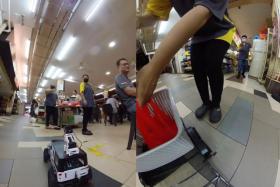Reflect on how wisely technology is used: SM Teo
Society may need to examine the effects of new technology before rushing to deploy it
The rise of artificial intelligence, cyber attacks and asymmetric warfare poses challenges to societies that want to be ahead of the game and not be left behind, said Senior Minister Teo Chee Hean yesterday.
But in the "headlong rush" to frame responses in terms of how to develop and deploy new technology more quickly, there is also a need to reflect on how well and how wisely technology is being used.
Whether people are prepared to deal with the consequences of the proliferation of such technologies should also be examined, said Mr Teo, addressing about 400 participants in his keynote address at the second Singapore Defence Technology Summit at the Shangri-La Hotel, organised by the Defence Science and Technology Agency.
The delegates included defence technology policymakers, national armament directors, chief technology officers, academics and entrepreneurs from 23 countries.
Mr Teo, who is also Coordinating Minister for National Security, suggested three questions for discussion for the audience, which had gathered to discuss topics around the theme of proliferation of technology and its implications on defence, security and society.
First, how can we be prepared for a world where machines are smarter than humans? Second, how can security be maintained in an increasingly connected world, and third, how can we avoid being blindsided by asymmetrical, low-tech warfare when there is a focus on high-tech warfare?
On artificial intelligence (AI), he noted that there were different schools of thought on whether machines can ever be smarter than humans.
While AI will allow machines to learn by themselves and become smarter and learn more, they might not know the difference between right and wrong. Machines might not be able to adapt to uncertainty, or take into account new factors and circumstances.
With an increasingly interconnected world, where people are relying more and more on "smart" devices in their daily lives, more potential vulnerabilities could open up, Mr Teo said.
There is also a need to depend more on data encryption, with the spectre of "unbreakable encryption" becoming an issue, he said.
But he asked whether coming up with new forms of defences can keep pace with attacks, which are becoming more ubiquitous and sophisticated.
"There are no simple solutions when everyday items are turned into weapons to strike at ordinary people going about their daily lives. Precisely because of how simple and close-up (they) are to each of us, such threats can have a greater psychological impact throughout society," he said.
Get The New Paper on your phone with the free TNP app. Download from the Apple App Store or Google Play Store now


